Writing & Rhetoric Excellence in Writing Awards
Excellence in Writing Awards April 2021
Honoring outstanding students and instructors for the 2020-2021 academic year.
Congratulations Graduates!
While we wish we could celebrate with a regular in-person pomp and circumstance, here is a slideshow of our Majors and Minors. Graduates are from Fall 2020 and Spring 2021.
Can't watch the video? Check out the slides on this pdf
Excellence in Writing & Research Awards
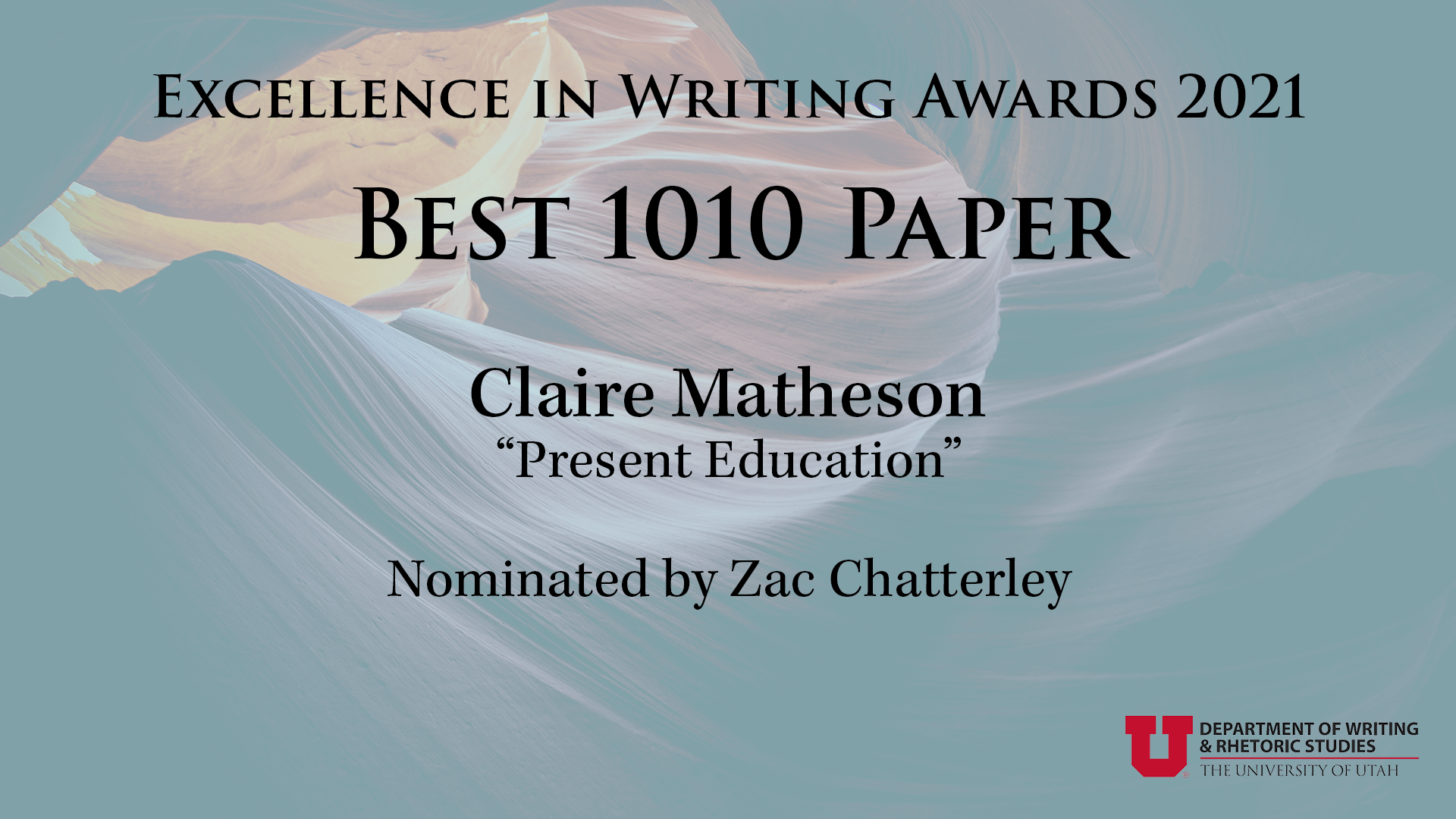
Winner: Claire Matheson
Paper: “Present Education”
Nominated by: Zac Chatterley
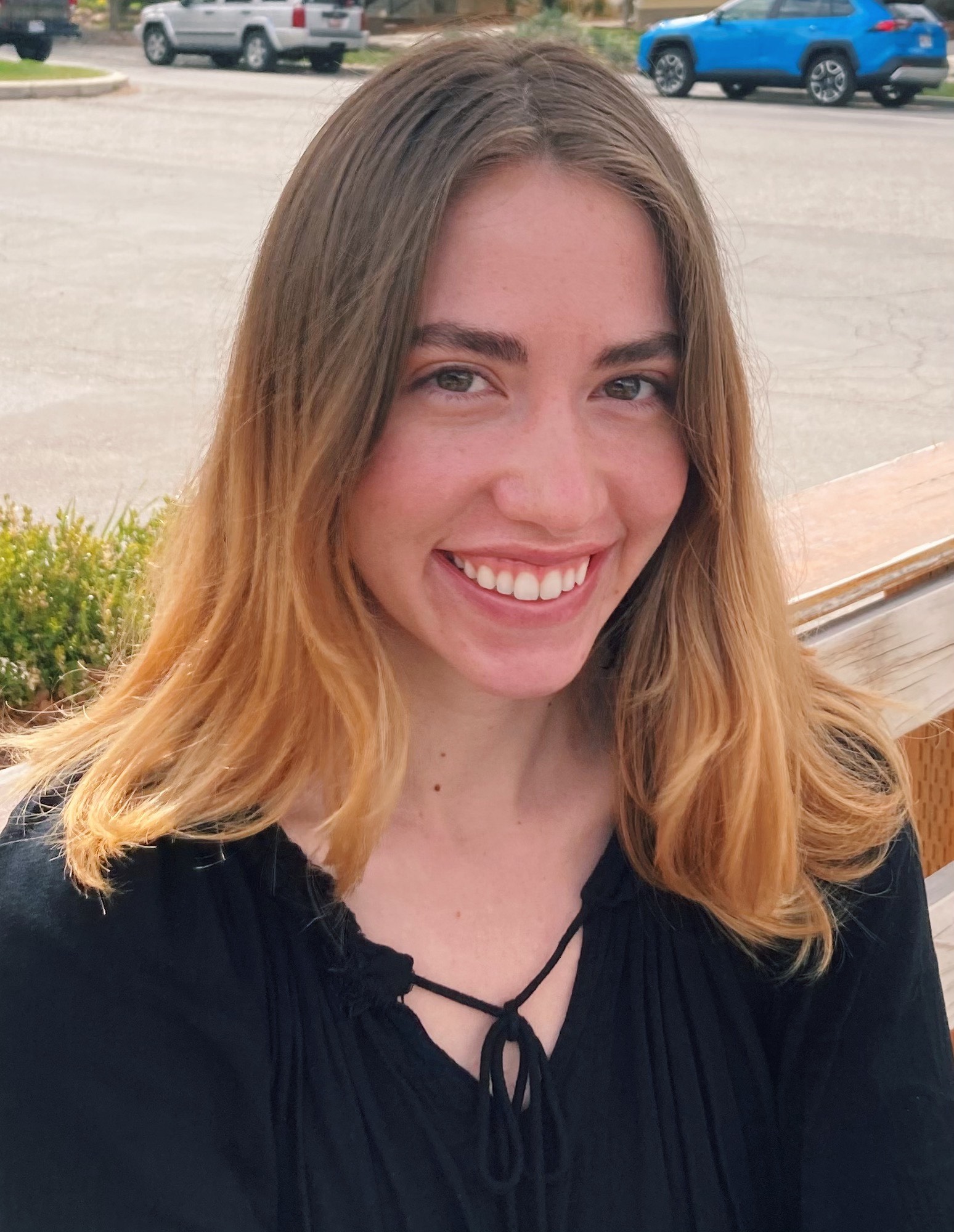 I am double majoring in Writing and Sociology with a focus on social capital, religion,
and fertility politics. I’m looking forward to not only learning about human interaction,
patterns of discrimination, and the possibilities of trusting communities, but also
improving the communication methods of positive societal change.
I am double majoring in Writing and Sociology with a focus on social capital, religion,
and fertility politics. I’m looking forward to not only learning about human interaction,
patterns of discrimination, and the possibilities of trusting communities, but also
improving the communication methods of positive societal change.
Over the past few years, I have come to appreciate my university education as a choice and a tool rather than as something that is expected of me. This has allowed me to recognize the purpose I want my higher education to serve: improving and cultivating skills to build better connections with people.
When asked to write a personal narrative in WRTG 1010, I wanted to explore the shift in my perception of education, to lay out the things that I have left behind and the things that I look forward to.
I enjoy writing, drawing, cooking for my friends, and introducing my ever growing list of nieces and nephews to tunes from the 60s and 70s.
Anyone who has taught for a few years eventually encounters a student who seems to be five steps ahead of everyone else in the class, including the instructor at times. Claire Matheson is one of those students: she is exceptionally intelligent and capable. She is a gifted writer and thinker, with a sophisticated sense of world events and politics.
During the difficult semester that was Fall 2020, Claire was a consistent highlight in my class. She’s genuinely impressive, and I’m hopeful that some of my colleagues get to have her as a student.
Her essay “Present Education” is beautifully crafted. It was the first fully developed paper Claire submitted in my class, and after reading the first five lines or so, I knew I was reading something exceptional. It’s an essay about the complicated process of finding reasons to stay motivated. It’s also about dealing with failures, finding alternative paths, and the solace that comes with simple human interactions.
I can’t do it justice in a paragraph, but suffice it to say it’s among the most intellectually and emotionally rich essays I’ve ever seen come out of a Freshman-level writing course. Immediately after reading it, I wrote comments to Claire asking her permission to nominate it for The Department of Writing and Rhetoric Studies’ yearly award ceremony. I was really happy (though honestly not surprised) to see that it won. It’s well-deserved.

Winner: Audrey Oltrogge
Paper: “Safeguarding our Futures: How Using Indigenous Cultural Burns can Mitigate Severity of Wildfires”
Nominated by: Sam Nelson
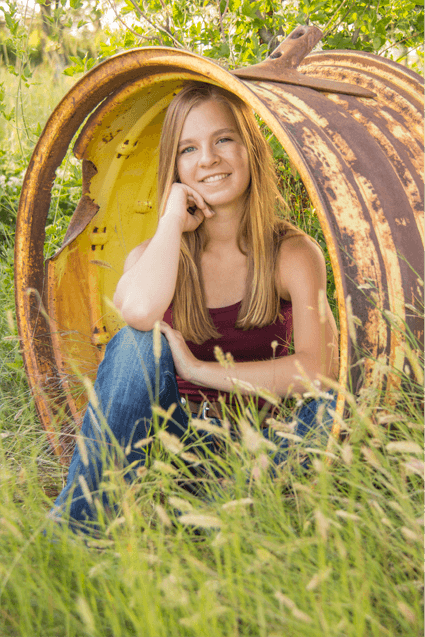 My name is Audrey Oltrogge. I am currently majoring in anthropology with an archaeological
science emphasis here at the University of Utah.
My name is Audrey Oltrogge. I am currently majoring in anthropology with an archaeological
science emphasis here at the University of Utah.
My goals are to graduate with my bachelor's of science, and then I would like to continue my education and pursue my master's degree.
A fun fact about me is that I showed chickens and sheep for ten years.
Coming soon.
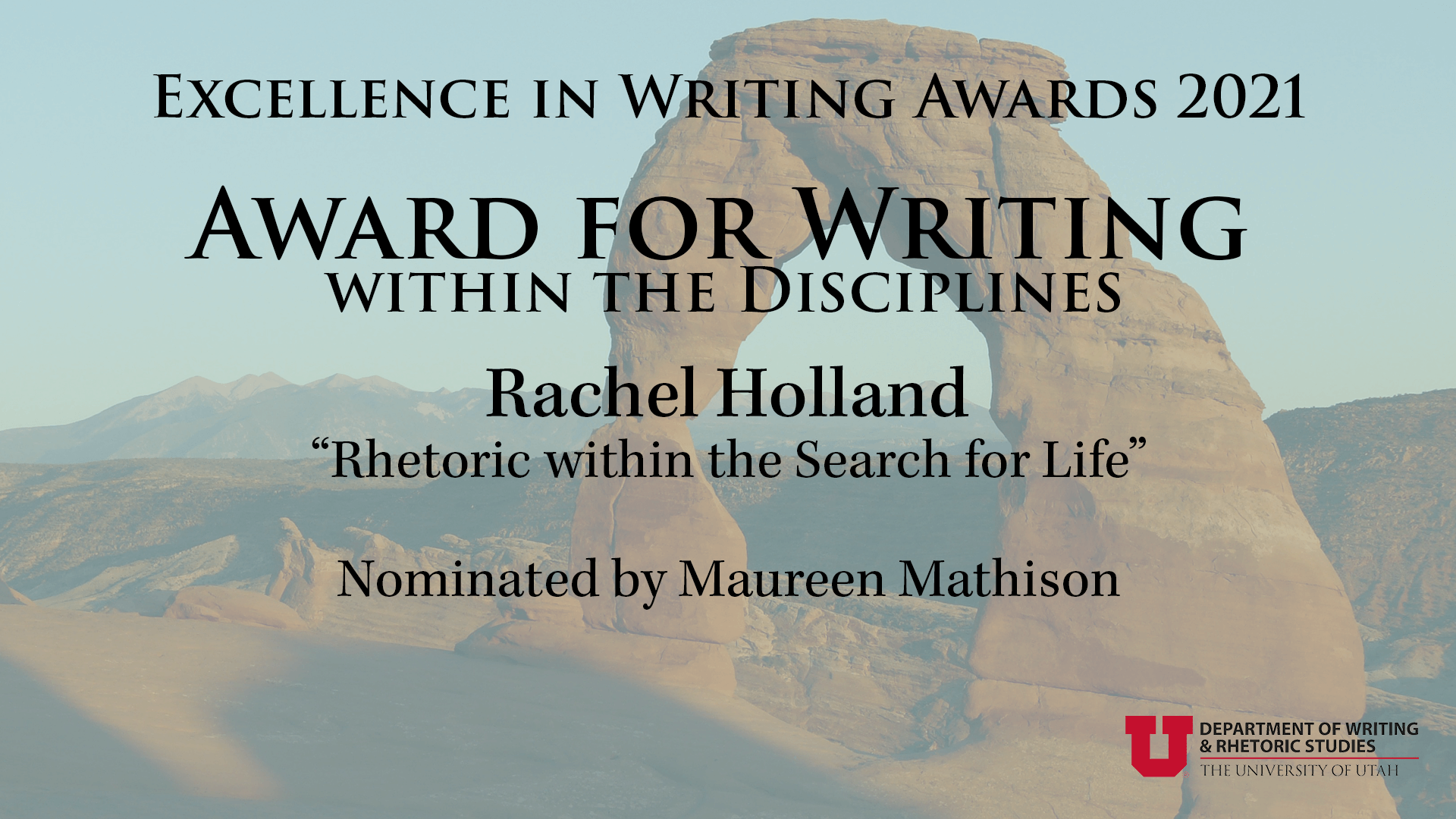
Winner: Rachel Holland
Paper: “Rhetoric within the Search for Life”
Nominated by: Maureen Mathison
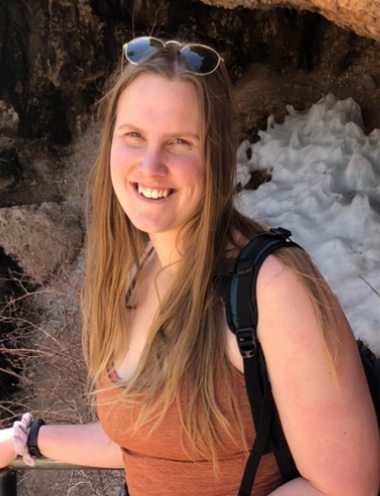
I’m a biochemistry and writing/rhetoric studies double major looking to pursue graduate school for genetic counseling. I’d love to be involved in research into the genetic components of autism and advocate for families with neurodivergent children. I’m also interested in science communication, as I would love to combine both writing and my love for the sciences!
Professor Mathison’s course on the rhetoric of science exposed me to some perspectives that are not usually discussed within the scientific community. A friend of mine is pursuing research in prebiotic chemistry, which got me thinking about how rhetoric could be applied to the huge endeavor of theorizing the origins of life. Defining “life” in the context of science is a lot more complicated than I originally thought, and opens an interesting conversation surrounding rhetoric’s role in science as a whole.
Outside of the classroom, I love weightlifting, reading, hiking, and taking care of my plants and pets!
Coming soon.
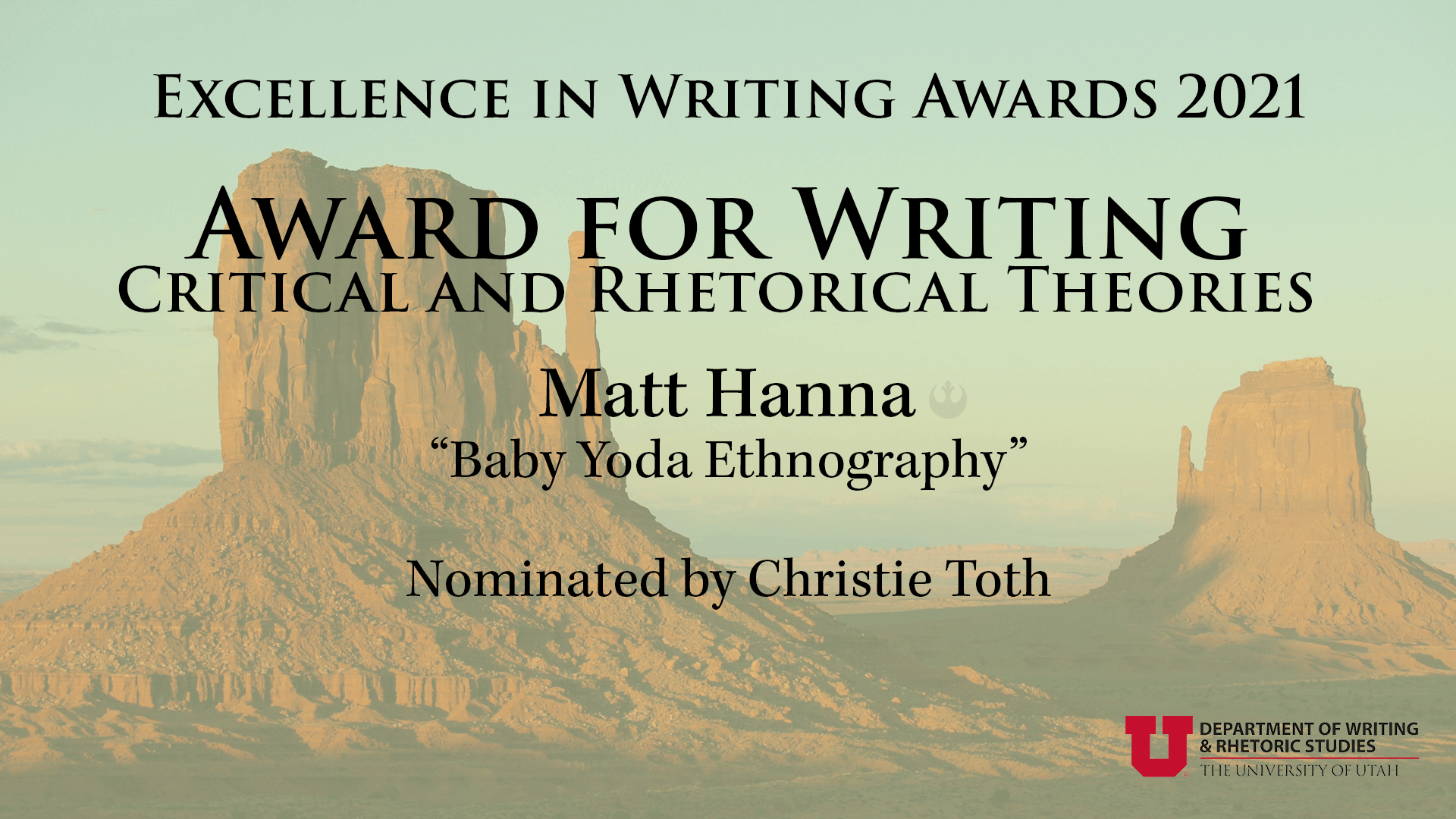
Winner: Matt Hanna
Paper: “Baby Yoda Ethnography"
Nominated by: Christie Toth
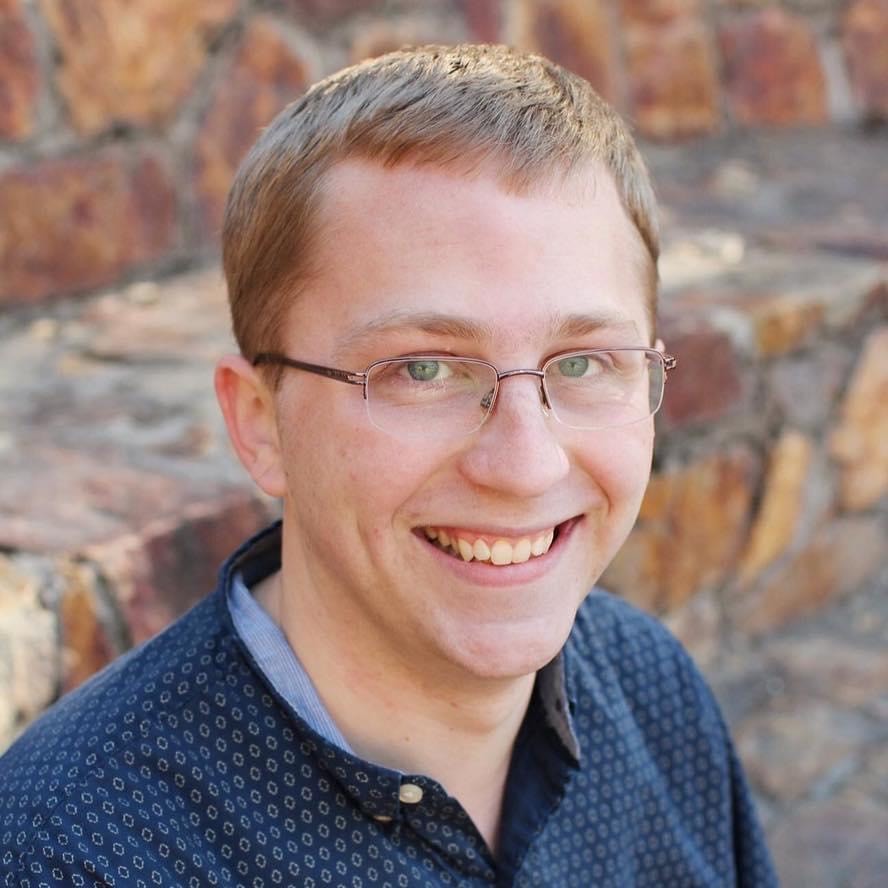 Hi, I'm Matt Hanna. My major is a BS in Writing & Rhetoric Studies
Hi, I'm Matt Hanna. My major is a BS in Writing & Rhetoric Studies
The paper is on the observations of the Reddit fan community surrounding the character otherwise known as Baby Yoda (especially at the time) during the first several weeks of the second season of The Mandalorian television series and how the community uses rhetoric in participating in that community. I chose the topic because I love The Mandalorian and have a soft spot for Baby Yoda and am a fan myself.
My goals are for my education is to finish my degree and improve everyday accessibility to using technology for people through User Experience research and design.
Something interesting about me is I love the thinking process behind games (physical and digital, especially ones that make you think) and I love observing the creation process for behind the scenes of film media, including the writing process, design choices, acting and costuming, and editing. The overall processes behind many things are fascinating.
In this online ethnography project for WRTG 3870, I thought Matt did a wonderful job of going deep into the ways that the Baby Yoda subreddit was helping people get through the pandemic. The topic seemed lighthearted but the analysis was ultimately very moving. Matt did great work taking this online community seriously and using key theoretical readings from the course to frame his analysis. I was thinking about this paper all through the winter and spring, and I'm thrilled that he's being recogized for this insightful study.
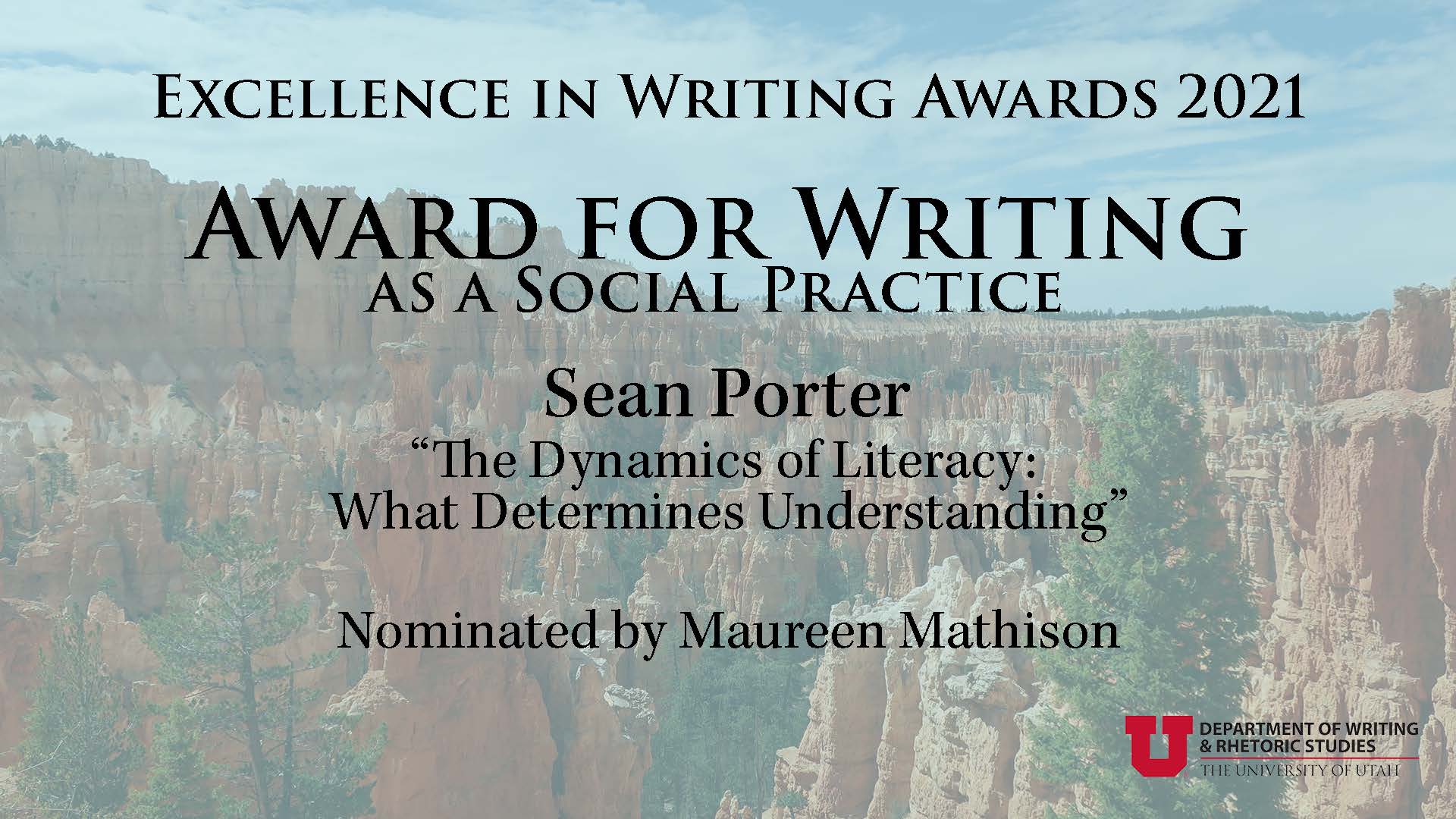
Winner: Sean Porter
Assignment: “The Dynamics of Literacy: What Determines Understanding”
Nominated by: Maureen Mathison
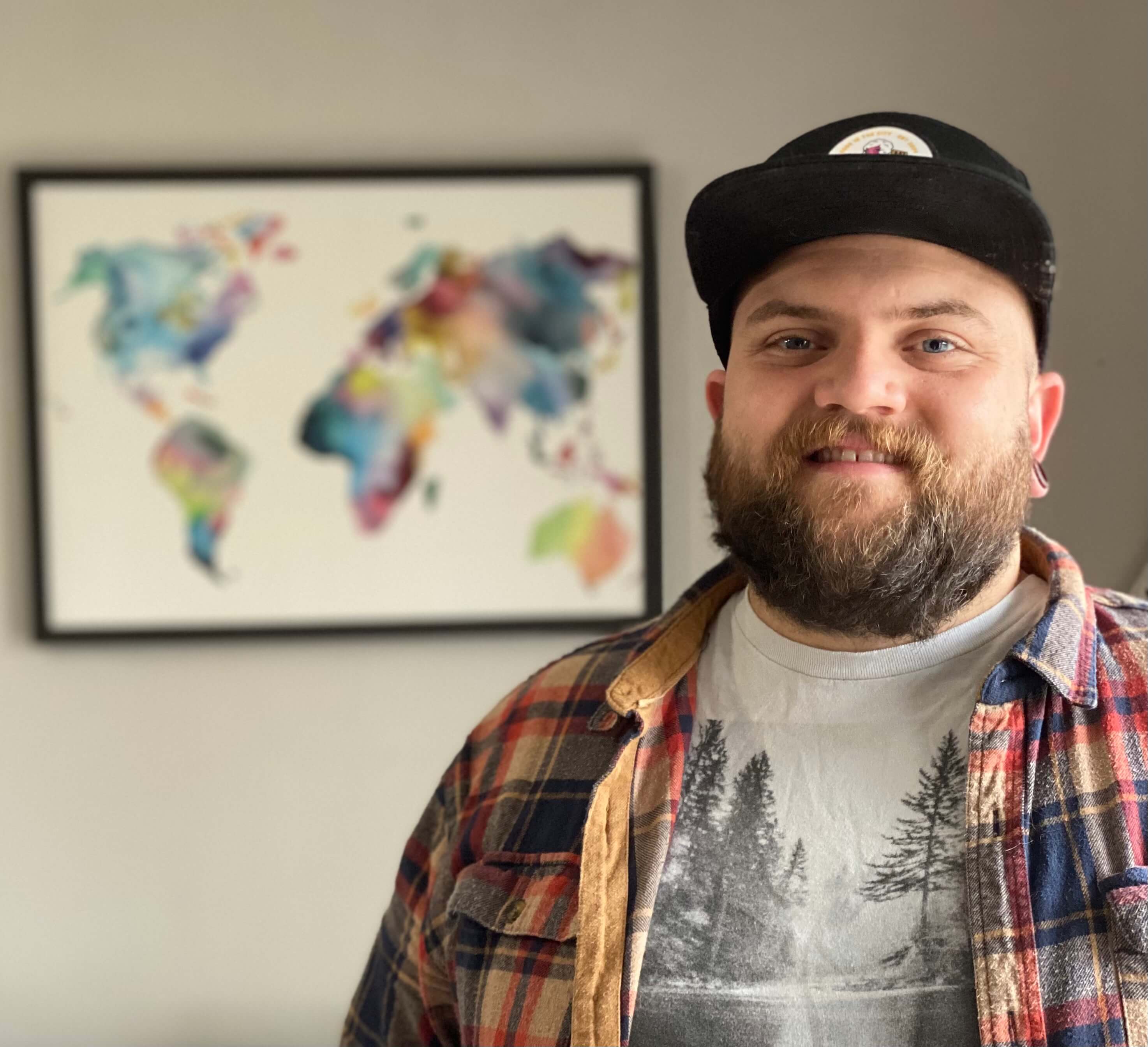 Hi, my name is Sean Porter. I’m majoring in Climate Change and Land Dynamics with
the U’s Physical Geography department and minoring in Writing & Rhetoric.
Hi, my name is Sean Porter. I’m majoring in Climate Change and Land Dynamics with
the U’s Physical Geography department and minoring in Writing & Rhetoric.
The piece I wrote reaches deep into my past as I unpack my perspective as a child growing up with a learning disability. My feelings of being misunderstood, mislabeled and cast aside. How through the support of my mother and my own tenacity, I pushed through the negativity. How one of my greatest weaknesses became a strength and genuine love. While not all of us have a learning disability, I think everyone can relate to times when they felt misunderstood and counted out.
I have a passion for environmental justice, writing and research. I want to merge these passions through freelance writing. As scientific research papers are dense and can be difficult for the everyday reader to apprehend. This creates an immense gap in the public understanding in both environmental research and environmental need. I want to bridge that gap by taking complex scientific knowledge and breaking it down into compelling and informative pieces that inspire action.
Coming soon.
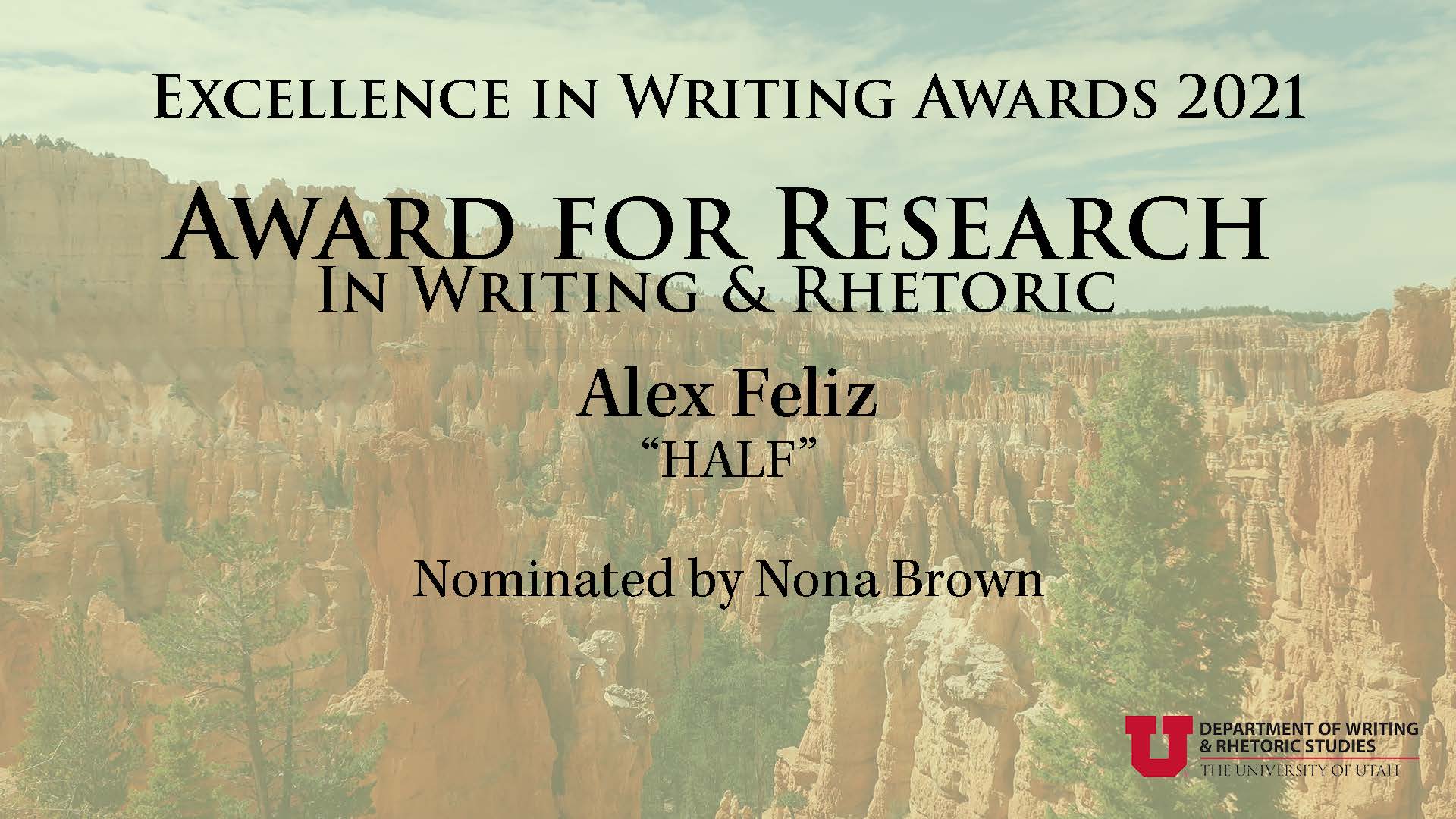
Winner: Alex Feliz
Assignment: "HALF"
Nominated by: Nona Brown
 I wrote Half after the murder of George Floyd. I wrote it because I had never had
the space to address/explore my biracial identity.
I wrote Half after the murder of George Floyd. I wrote it because I had never had
the space to address/explore my biracial identity.
I'm majoring in Psychology, with minors in Writing & Rhetoric, and Modern Dance. After, I'm interested in pursuing law school.
I'm also the author of Growing Pains, a collection of poetry and prose!
Alexandra Feliz has taken several courses with me, beginning with 3018: Writing About Popular Culture in the spring of last year. During this time, I’ve witnessed the trajectory of her development as a writer, intellectual, and creative force. The essay “Half,” authored in the midst of pandemic and protest, reflects Alex's courage, candor, and rhetorical acumen; moreover, the writing is powerfully rendered, deeply insightful, and radiant with emotional intelligence.
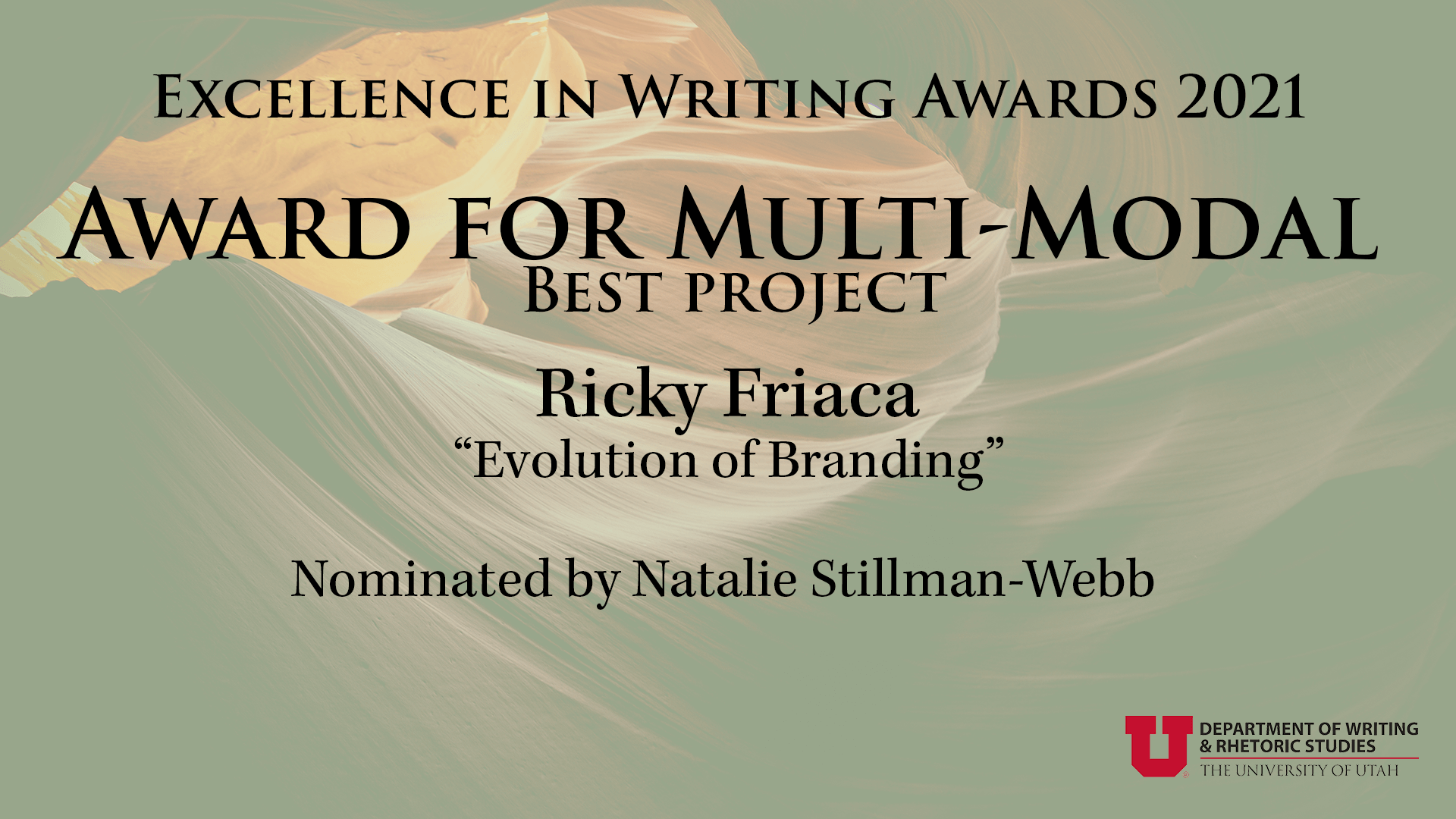
Winner: Ricky Friaca
Assignment: “Evolution of Branding”
Nominated by: Natalie Stillman-Webb
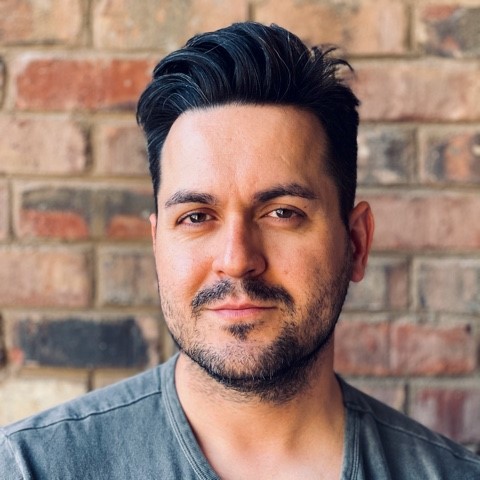 Hi I’m Ricky! My course of study is a BFA in graphic design with a passion for conceptual-design
thinking, branding, and illustration. I’m originally from Brazil but grew up most
of my life here in Utah. I'm serving in the Utah Army National Guard as an electrician
for Blackhawk helicopters, but my main gigs consist of being a father of two lively
little girls, a Technical Expert for Apple, and a freelance designer. My goal is to
one day be able to apply my design skills at a leading design firm, or better yet,
start my own!
Hi I’m Ricky! My course of study is a BFA in graphic design with a passion for conceptual-design
thinking, branding, and illustration. I’m originally from Brazil but grew up most
of my life here in Utah. I'm serving in the Utah Army National Guard as an electrician
for Blackhawk helicopters, but my main gigs consist of being a father of two lively
little girls, a Technical Expert for Apple, and a freelance designer. My goal is to
one day be able to apply my design skills at a leading design firm, or better yet,
start my own!
The reason behind exploring how the identity systems of some of the most well-known
fast food brands evolved, was most likely due to my course of study coupled with a
late-night craving for some hot, crisp french fries, or a greasy burger while brainstorming
ideas for this project. In that moment, it made perfect sense for me to mash (pun
intended) my want of comfort food and my formal education in branding. Through the
project, I hoped to clear up some common misconceptions about what a brand is while
also exploring some interesting concepts surrounding these companies’ strategic decisions to
visually communicate their brand over the years.
I’m honored to receive this award and can definitely say that even though it doesn’t
top the time I randomly met George Lucas in passing at a lodge in Park City, it’s
definitely cooler than the time I passed Nicholas Cage on an escalator in Vegas!
Ricky Friaca produced excellent work throughout our Visual Rhetoric class, from writing an analysis of Banksy’s Park City street art, and creating an infographic examining the scope of deaths by suicide in the US armed forces, to composing his winning selection for the multimodal writing award, “Evolution of Food Franchise Branding.”
In his video integrating images, alphabetic text, and audio narration, Ricky describes the ways that “brandmarks have become simplified and iconic by eliminating type, color, and imagery, as a result of growing brand recognition and technological advances.” He supports his claim by integrating compelling examples from across the chain restaurant industry. The video’s design is clean and compelling; the narration is carefully scripted, yet its delivery is conversational and engaging.
Analysis can be a difficult skill, and Ricky is adept at examining how the component parts of any text contribute to the meaning of the whole.
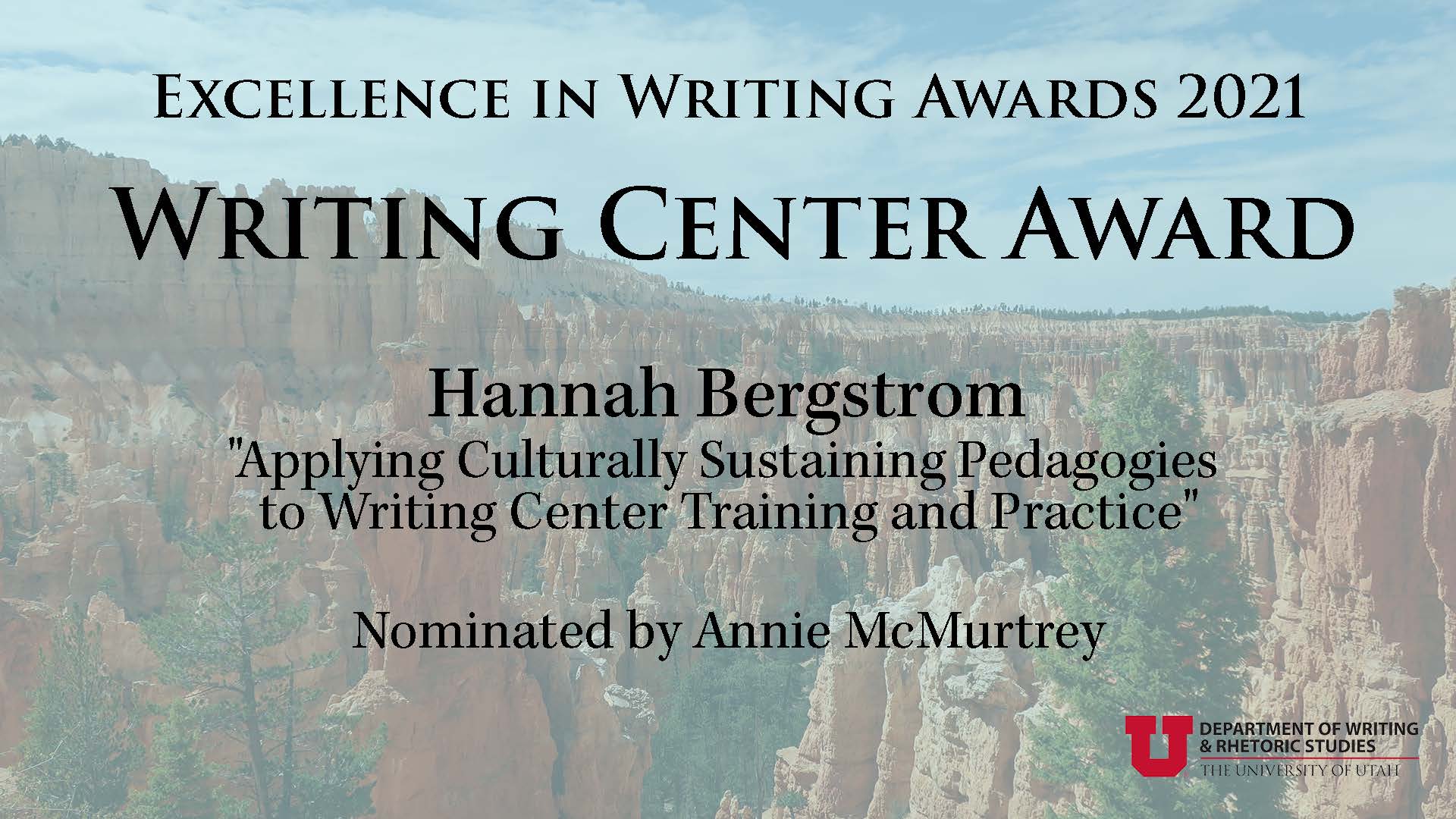
Winner: Hannah Bergstrom
Assignment: “Decentering Whiteness in University Writing Centers: Applying Culturally Sustaining Pedagogies to Writing Center Training and Practice”
Nominated by: Annie McMurtrey
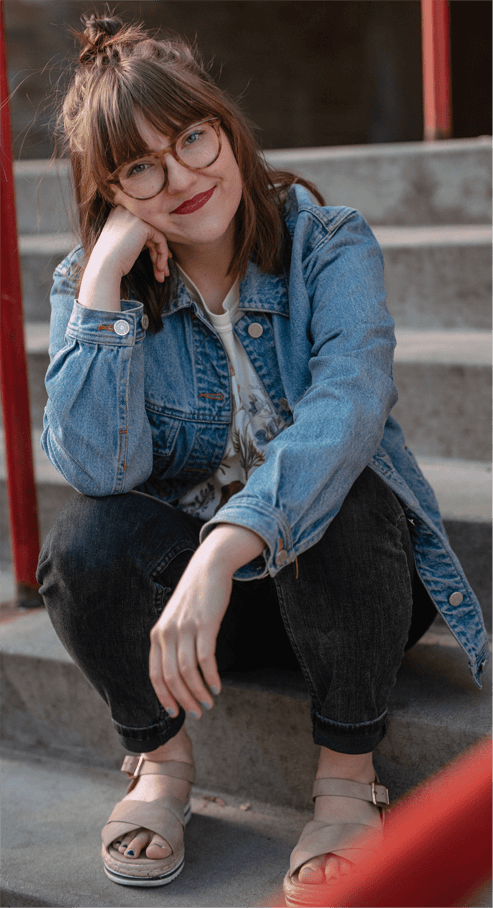 My name is Hannah Bergstrom and I graduated from the University of Utah in 2019 with
degrees in Writing and Rhetoric Studies and Anthropology. I am now pursuing a Master's
degree in Education, Culture, and Society (ECS) at the University of Utah.
My name is Hannah Bergstrom and I graduated from the University of Utah in 2019 with
degrees in Writing and Rhetoric Studies and Anthropology. I am now pursuing a Master's
degree in Education, Culture, and Society (ECS) at the University of Utah.
Throughout my undergraduate years I worked in the Writing Center at the U, and now enjoy being a graduate writing fellow at the Graduate Writing Center. I love writing and helping others through the writing process, and hope to continue pursuing these passions in my future career.
ECS is an incredible program that critically examines issues of social justice in education. This program has allowed me the opportunity to explore challenges I come in contact with at the writing center through theoretical frameworks such as whiteness studies and critical race theory.
My paper "Applying Culturally Sustaining Pedagogies to Writing Center Training and Practice" explores the intersections between writing center pedagogy and Culturally Sustaining Pedagogies (CSP) and shows how writing centers can take inspiration from the projects, programs, workshops, and strategies employed by CSP practitioners to address the issues that have been theorized about in writing center scholarship.
I had the opportunity to present this paper at Rocky Mountain Writing Center Association's TutorCon 2021. I am very grateful to Annie and the Department of Writing and Rhetoric Studies for this award."
I’ve known Hannah Bergstrom since 2016, when I hired her as an undergraduate writing tutor. In her three years as a writing tutor, she impressed me with her ability to support writers from across the disciplines. In my tutor training course, she was a quick learner and masterfully applied concepts from our class to her tutorials in the writing center. Her calm friendliness made her approachable, and her knowledge of writing, desire to help others, and her ethic care, led to nearly 600 effective tutorials. Her client evaluations repeatedly described her as “helpful,” “smart,” “encouraging,” and “patient.”
In 2020, I made the easy decision to hire Hannah as a Graduate Writing Fellow in the Graduate Writing Center, where, in the past nine months, she has led nearly 200 online tutorials and has received a 100% satisfaction rating from her clients.
All of these things would make her a worthy recipient of this award, but her research also sets her apart.
One of my favorite things to see in my tutors is a genuine interest in the ways that their fields of study overlap and influence their work in the writing center and vice versa. I was obviously thrilled, then, to hear that Hannah’s ECS research on Culturally Sustaining Pedagogies found a place in her conference proposal to this year’s Rocky Mountain Writing Center Association’s TutorCon. Her proposal was accepted, and she presented her paper in early March.
For all of these reasons, I am honored to present Hannah with this award.
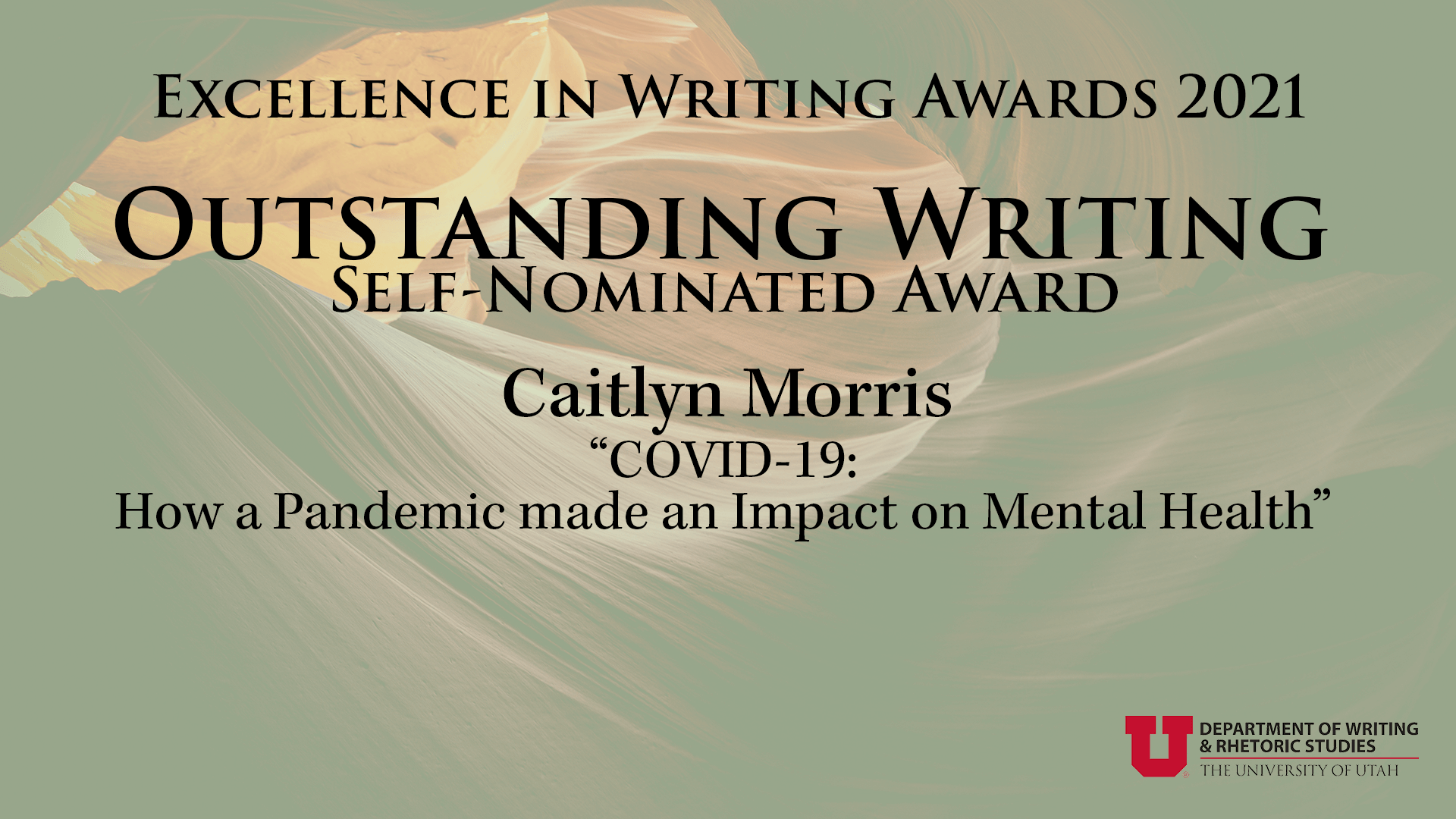
Winner: Caitlyn Morris
Assignment: “COVID-19: How a Pandemic made an Impact on Mental Health”
Class: WRTG 2010
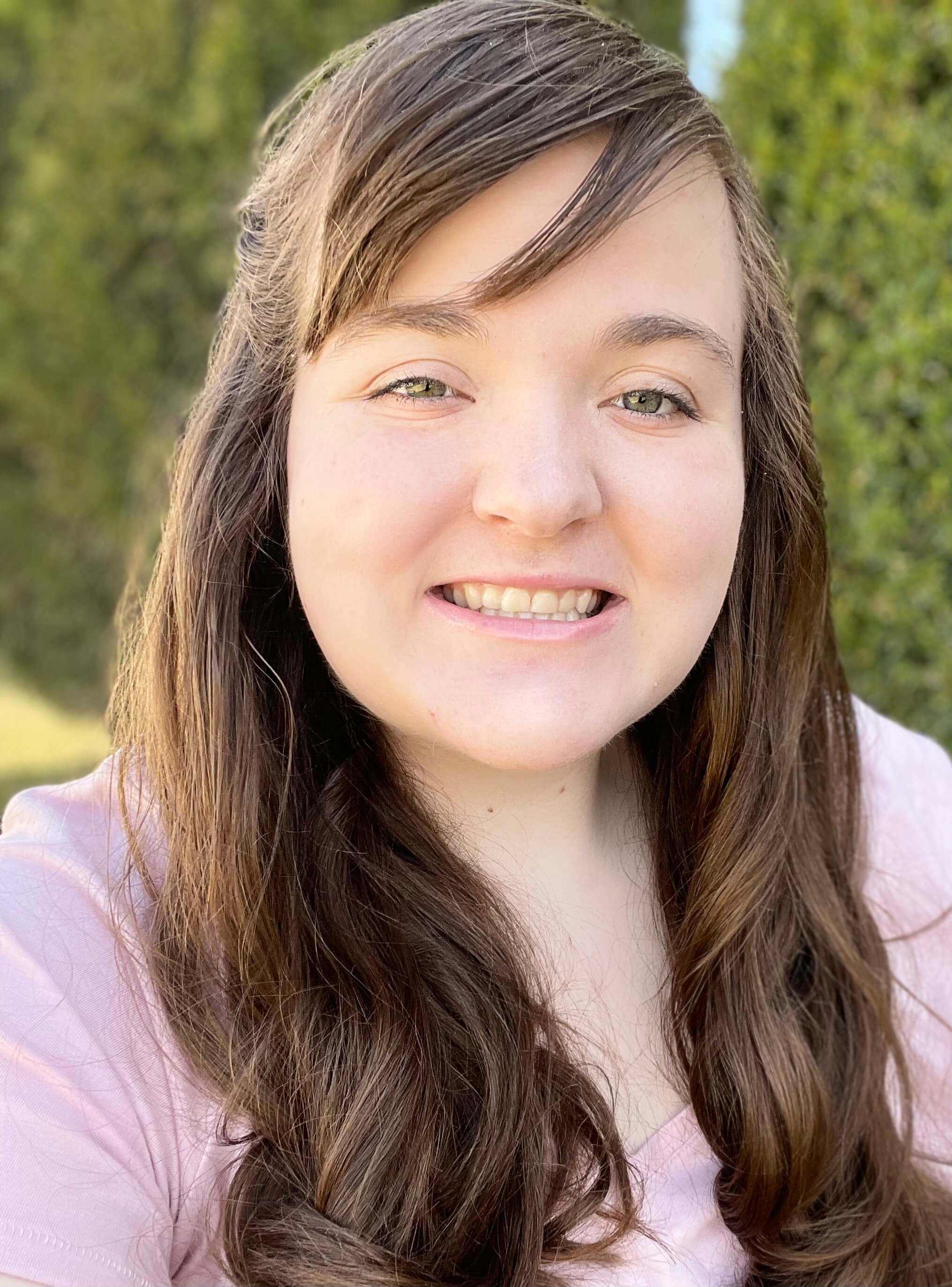
Caitlyn Morris is a Speech and Hearing Sciences major at the University of Utah. Once she graduates with her bachelors, she plans on pursuing a masters degree in speech pathology.
Caitlyn wrote “COVID-19: How a pandemic made an impact on mental health” as a researched argument for her WRTG 2010 class. What drove her to write about this topic was her family members personal experience with COVID-19’s precautions and her own personal experience with the pandemic. Her focus argument targets audiences such as kids, adolescents, adults, elders and even medical workers.
Outside of Caitlyn’s studies, she is involved with The University of Utah's National Student Speech Language Hearing Association and Storytime Improv. She also loves to play the piano, take photos, and participate in projects as an actress, whether it be on stage or on screen.
Instructor Excellence Awards
Zac Chatterley
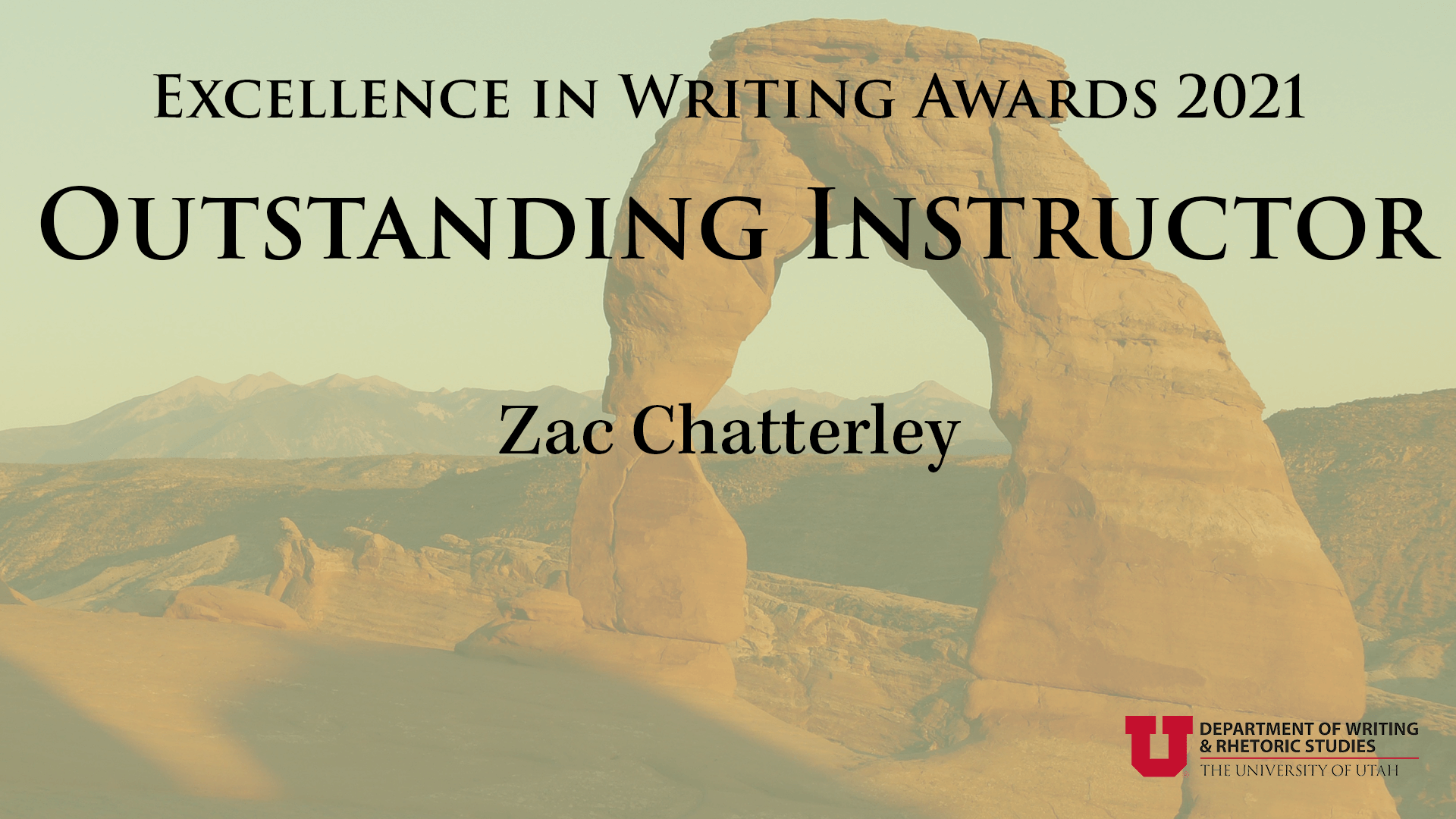

Going to college was not a foregone conclusion for me. I struggled to graduate high school, and I probably would have dropped out had it not been for a particularly committed woodshop teacher. After graduating, I chose not to attend college, instead working manual labor jobs for two years. Gradually, I started attending occasional classes at a local community college, night classes at first, then a couple of day classes. Most of them were fine, if not exactly amazing.
But there were a handful of professors who had a particularly profound influence on me. They were passionate about what they taught, and they awakened a dormant passion in me. I realized that I was not as inept as the public school system had led me to believe, and over the course of a year or two, I “woke up.” I realized that there was a world much bigger than the confines of my home town, and that there were other, more useful ways of thinking. I no longer saw myself as a menial laborer, but rather as a committed student who wanted to make the world better in some way. I re-envisioned my future: I wanted to be a teacher, to give students what my professors had given me.
On an idealistic level, I wish to guide students toward their own intellectual awakening, to get them mentally engaged and to help them feel the satisfaction that comes from thinking critically. I want my students to recognize that there’s a much bigger world than they may have experienced, and I’m committed to helping them build themselves up as people and as citizens. I see in many of them the latent intellectual spark that was in me, and my goal is to help them discover it.
On a more practical level, I want to teach my students how to succeed in college so that they too can realize their own academic potential. If I were to distill my teaching philosophy to a single statement, it would be this: teachers should enter the classroom with a well-defined set of goals, and those goals should in some way benefit the students. I teach students how to write college essays. I present my lessons as a practical set of skills that will serve my students well in college and perhaps in the professional world. If I do not always manage to generate an intellectual awakening, then at the very least I try to show the students how to succeed in college so that someday, perhaps gradually, their intellectual awakening will come.
Donny Penner
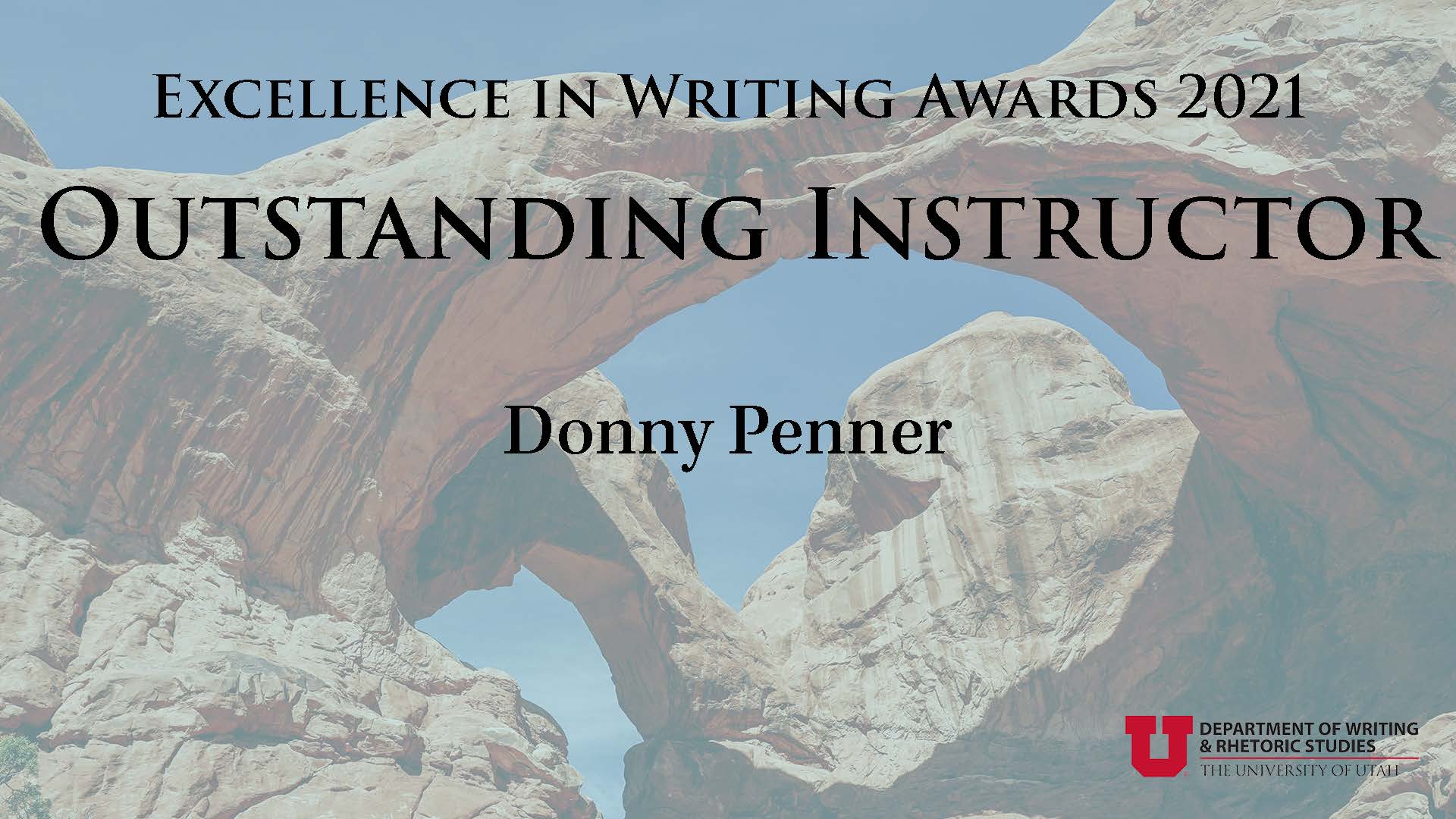
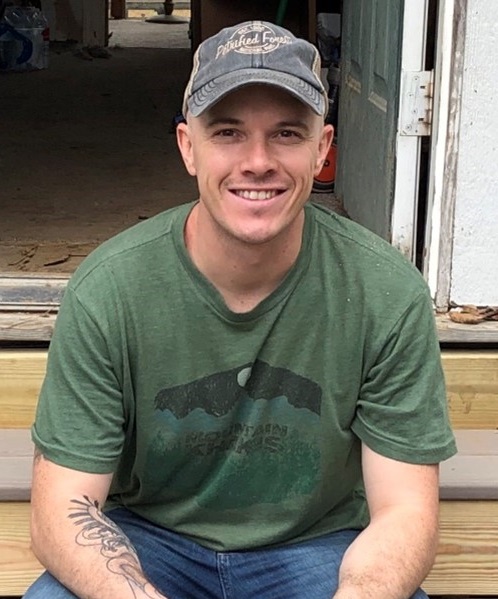 Donny Penner is a first-year PhD student at the University of Utah. His research interests
include ecological theories of writing, community colleges, and working class rhetorics.
He currently teaches WRTG 2010 at the University of Utah and ENGL 2010 at Salt Lake
Community College.
Donny Penner is a first-year PhD student at the University of Utah. His research interests
include ecological theories of writing, community colleges, and working class rhetorics.
He currently teaches WRTG 2010 at the University of Utah and ENGL 2010 at Salt Lake
Community College.
Teaching Philosophy
A friend recently asked me if I wanted to be for community or of community. I think my teaching philosophy answers that question. I seek to treat the classroom like a community that prioritizes a sense of belonging, where each member feels like a crucial piece of the discursive and physical environments that impact both process and product.
In my role as a teacher, I do not hide power structures. Instead, I seek to make them visible as pieces of the writing ecosystem that might be examined critically. Given these inevitable power structures, I prioritize two ideas.
Teaching Philosophy (continued)
First, I believe students must feel safe as community members. Safe enough to speak. Safe enough to write. Safe enough to be.
Second, I cultivate a rhetoric of respect in classroom relationships. As described in the book of the same name, a rhetoric of respect requires me, as teacher/mentor/coach, to “maintain a solid faith in a potential partner's own capability and in their agency to determine what they need or want.”
I’ve often found that when student agency is celebrated, they no longer see themselves only as students, but as community members who can simultaneously learn and contribute. In sum, I want to belong to my class, not just be an advocate for it.
Goals and Hopes for my Education
After I finish this PhD, I hope to teach writing skills to working class folks. I’m not sure whether that will be at a university, a community college, or in some other space.
Wherever I go, my goal is to pass on the what I’ve gained from my humanities education: critical thinking skills, endless curiosity, and an appreciation for civics.
Something Quirky
Anyone who knows me is familiar with my extreme musical tastes. I’m a connoisseur of metal music. I collect vinyl records from bands all around the world and when I’m not teaching (or maybe when I am), you’ll probably see me wearing an over-the-top band t-shirt.
Hugh Shuckman
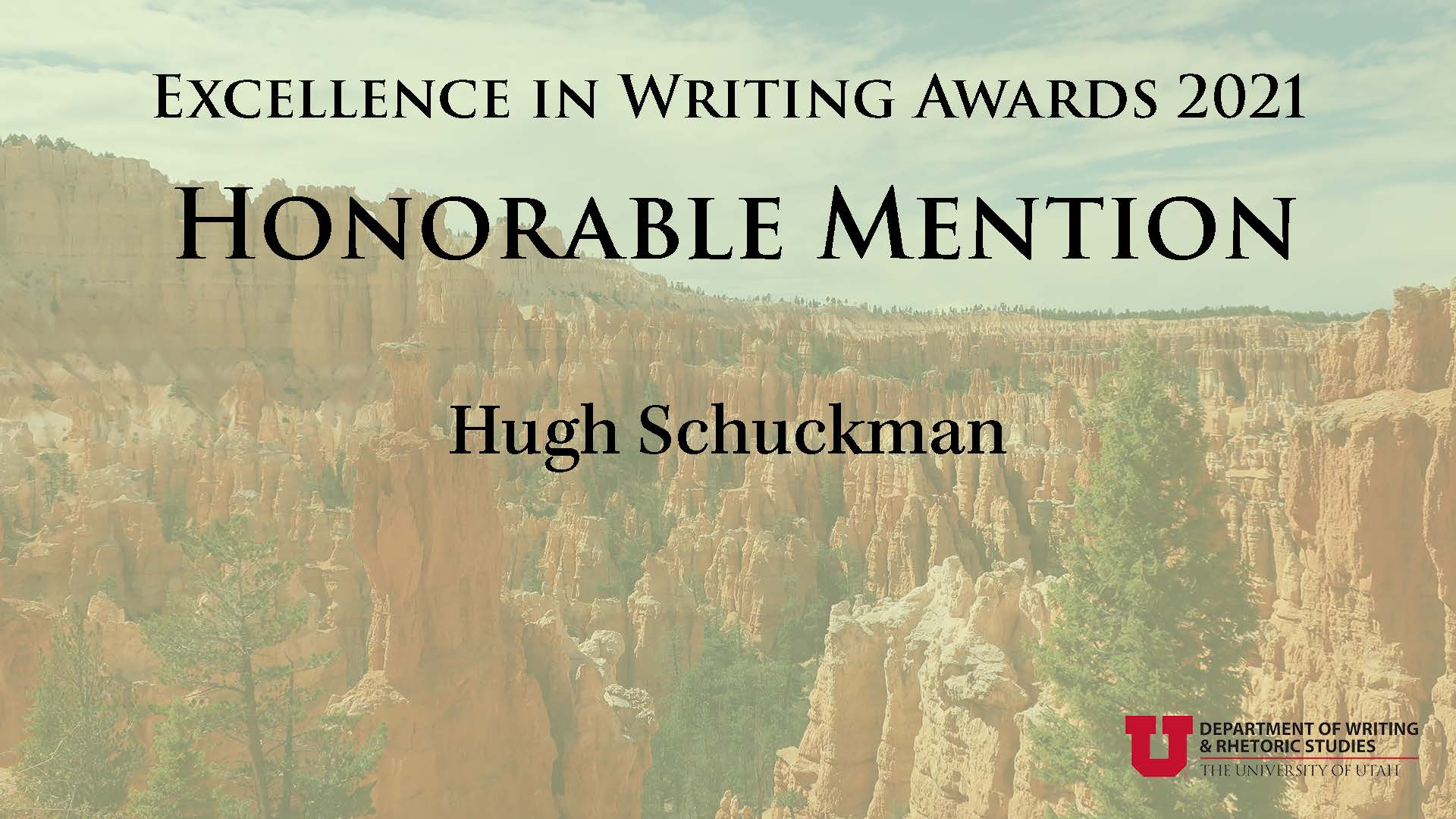
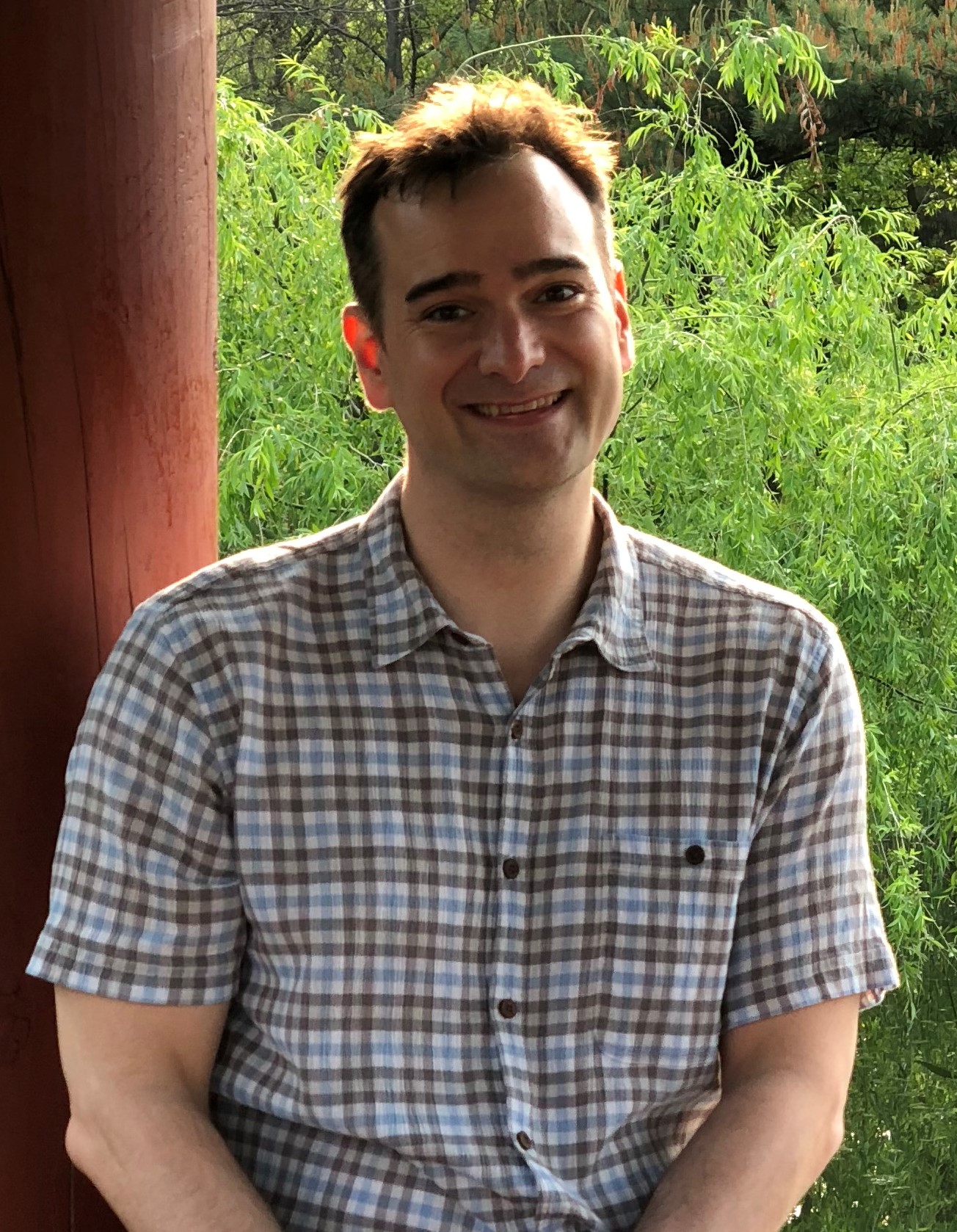
Professor Hugh Schuckman teaches courses in the Writing & Rhetoric Department at The University of Utah Asia Campus.
He earned an MA at Columbia University, New York City in the field of Buddhist Studies and later completed a Masters of Theological Studies at Harvard University Divinity School.
After teaching in a variety of countries (Japan, S. Korea, and Mongolia), he focused on education at UCLA’s Graduate School of Education and Information Studies and received a Ph.D. in International and Comparative Education.
Before coming to the University of Utah, Prof. Schuckman taught research writing at Prince Sultan University (Riyadh, Saudi Arabia) and the Korea Development Institute of Public Policy and Management (Seoul, Korea).
He currently teaches classes in several fields, including Religions of Asia, School and Society, Writing Center Theory and Practice, Rhetoric of Democracy, and Global Citizenship.
Department Chair Award
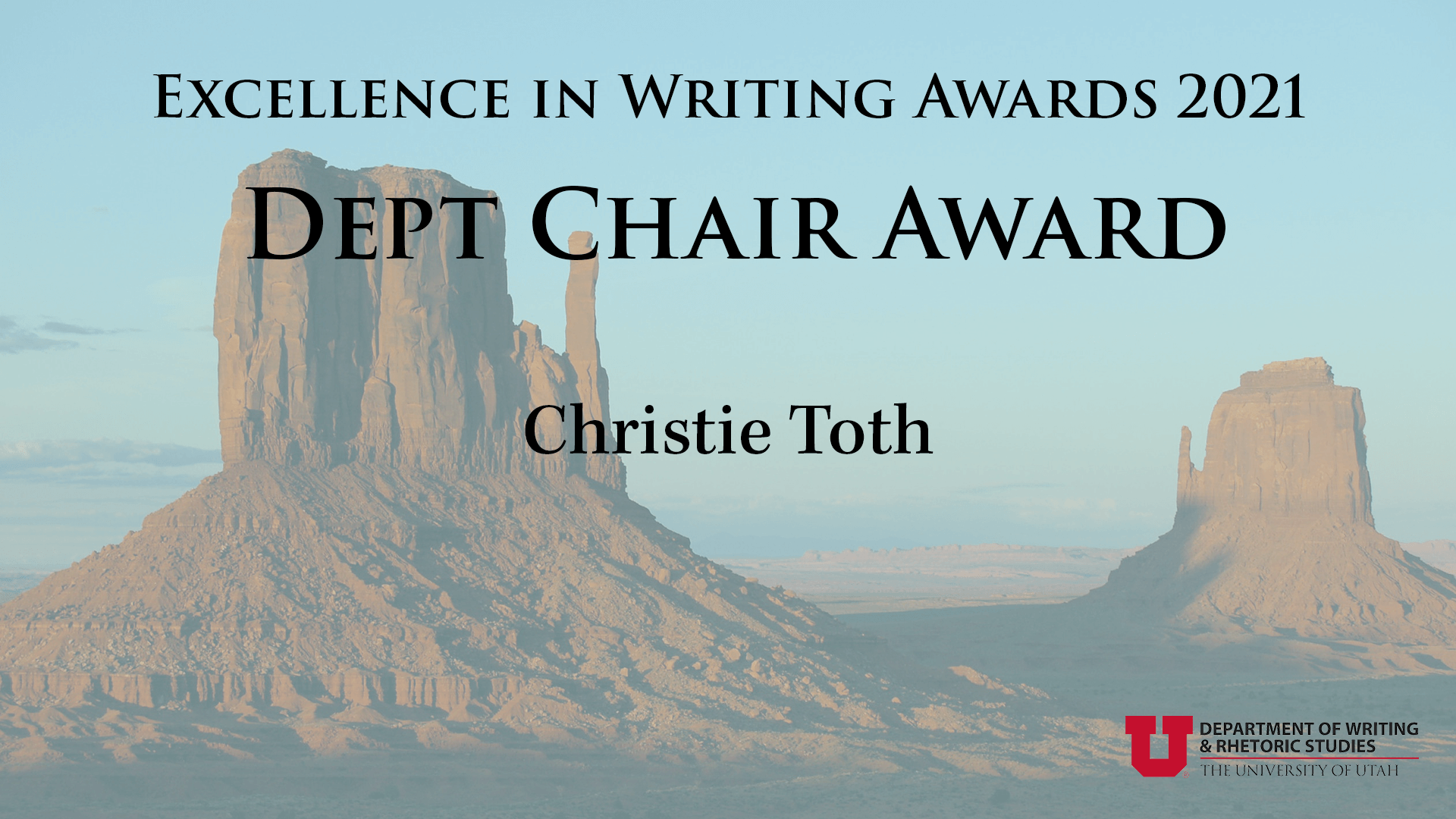
Christie Toth
This Award is given by our Department Chair, Dr. LuMing Mao. Recipients are awarded for their positive impact on the Department of Writing & Rhetoric Studies.
Since 2015, Professor Toth has led our various inter-institutional collaborations with SLCC, and she became the department’s Coordinator of Transfer Initiatives in 2017. These collaborations included forming major articulation agreements with SLCC: first with their Writing Certificate of Completion (2015), and then their new AS in Writing Studies (2018), which was developed in explicit partnership with WRS. She collaborated with SLCC transfer students and faculty colleagues to develop the Writing Studies Scholars (WSS) program, a comprehensive bridge and post-transfer support program for SLCC students entering our WRS major.
Since it was launched in 2017, WSS has brought in more than $200,000 dollars in external funding from local foundations and individual donations, over 90% of which has gone directly to students in the form of scholarships, paid research and teaching assistantships, and other professional development opportunities.
As of Spring 2021, WSS has served 80 SLCC transfer students, of whom 73% have been first-generation college students, 67% have been women, 60% have been students of color, and 57% have been from multilingual immigrant families. Thanks to her leadership, WSS has not only survived a once-in-a-lifetime pandemic but also continued its growth as is evidenced in the fact that the Summer 2021 bridge course is already full.
On April 7th, 2021, at this year’s TYCA’s annual opening meeting, in recognition of this innovative and groundbreaking partnership, our department and SLCC’s Department of English, Linguistics, and Writing Studies were awarded the Diana Hacker Award for TYCA Outstanding Programs in English in the category of “Reaching Across Borders.”
It is fair to state that without Christie, without her leadership, her vision, her boundless energy and unyielding commitment, we would not have the Writing Studies Scholars program, nor would we have the kind of inter-institutional partnership with SLCC. I cannot think of a more deserving recipient than Professor Christie Toth for this year’s Chair’s Award.
Congratulations, Christie!
